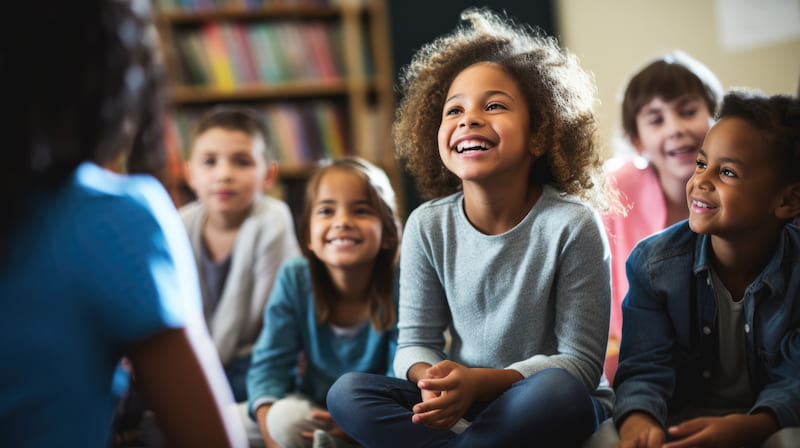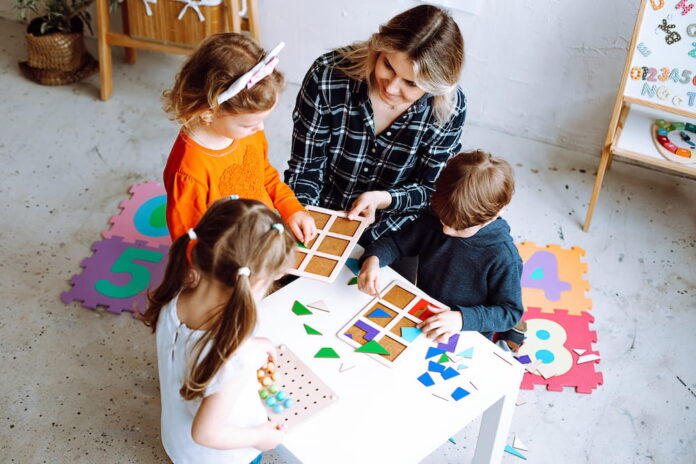Remember those meltdowns in the grocery store? The ones where your child, fueled by sugary cereal desires, transformed the cereal aisle into their battlefield? Yeah, those. Frustrating, right? Now imagine those meltdowns becoming a pattern, morphing into social anxieties at school or struggles to make friends. These challenges can leave both you and your child feeling overwhelmed.
But there’s a bright side! A powerful tool exists that can help set your child up for success, not just academically but emotionally as well. It’s called Early Childhood Education (ECE), and it’s much more than coloring pages and finger paints.
This blog post will explore the surprising connection between ECE and your child’s long-term mental health. It’ll look at how these programs equip your little one with the skills they need to thrive, not just now but well into the future. Ready to see the possibilities? Visit our Belmore center at Little Scribblers and see how ECE can benefit your child!
Understanding Early Childhood Education
Have you ever wondered what exactly goes on behind the doors of those colorful preschool buildings or bustling daycare centers? ECE encompasses a variety of programs and settings designed to nurture and educate young children, typically from birth to around age eight. Think of it as the foundation for your child’s learning journey, a place where they’ll explore numbers and letters and develop crucial social-emotional skills to set them up for success in school and beyond.
There’s a wide range of ECE programs available, each with its own approach. Some focus on play-based learning, where children learn through exploration, discovery, and interaction with their peers. Others might incorporate more structured activities and curriculum to prepare children for kindergarten.
How Early Childhood Education Makes a Difference

High-quality ECE programs go beyond basic academics. They provide a nurturing environment that fosters a child’s overall well-being, setting the stage for future success. Explore some key ways ECE programs make a difference:
– Enhances Social-Emotional Learning (SEL): Picture your child confidently navigating a playground dispute, expressing their emotions calmly, or collaborating effectively with other kids. ECE programs weave SEL into their curriculum, teaching children valuable skills like self-awareness, empathy, and conflict resolution.
– Provides positive teacher-child interactions: Strong, supportive relationships are critical for healthy development. ECE programs with qualified and caring teachers provide just that. The teachers act as mentors and guides, fostering a sense of security and trust in children.
– Ensures a safe and stimulating environment: Picture a classroom filled with engaging toys, books, and materials that spark curiosity and creativity. Now imagine it paired with clear routines and consistent expectations that promote a sense of safety and security. This classroom is the ideal ECE environment.
By providing these essential elements, ECE programs equip children with the social-emotional skills, positive relationships, and confidence they need to thrive throughout their lives.
Now, here’s the impact of ECE on long-term mental health:
Improved Coping Skills
Think about your child facing a challenging situation – a disagreement with a friend, perhaps, or difficulty completing a task. How would they handle it? ECE equips them with the tools they need to navigate these everyday hurdles effectively. Through SEL activities and everyday interactions, ECE programs teach children valuable strategies for:
– Identifying and understanding their emotions: Children learn to recognize their feelings, whether it’s frustration, sadness, or excitement.
– Expressing their feelings in healthy ways: ECE programs teach children about emotions and how to express them constructively. These programs might involve using “I” statements, taking deep breaths to calm down, or finding a quiet space to process their feelings.
– Problem-solving and conflict resolution: Through guided play and teacher intervention, children learn valuable problem-solving skills. They discover how to negotiate, compromise, and find solutions to conflicts positively and respectfully.
By developing these coping skills, children gain a sense of control over their emotions. They learn to navigate challenging situations with confidence, building emotional intelligence that will benefit them throughout their lives.
Increased Resilience
Imagine your child struggling to build a block tower, encountering repeated frustration as the blocks tumble down. In an ECE setting, teachers wouldn’t simply rebuild the tower. Instead, they’d guide the child through problem-solving strategies, encouraging them to try different techniques and persevere. This approach fosters increased resilience.
Through these everyday experiences, children learn that setbacks are a natural part of the learning process, developing the confidence and tools to bounce back from challenges and keep trying. This resilience translates into a stronger emotional foundation, better equipping them to navigate the inevitable bumps life throws their way.
Reduced Risk of Mental Illness
The benefits of ECE extend far beyond the preschool years. Studies suggest that high-quality ECE programs can play a role in reducing the risk of mental illness later in life. By equipping children with strong social-emotional skills, self-regulation tools, and a sense of resilience, ECE programs can help prevent the development of conditions like anxiety and depression down the road. This program translates into a healthier, happier future for your child.
Final Thoughts
Your child’s early years are a critical window for emotional development. While academics are important, fostering strong social-emotional skills is equally essential for their long-term well-being. High-quality ECE programs go beyond memorizing numbers and letters. They equip children with the tools they need to thrive, not just in school but in life. Take the first step towards a brighter future for your child. Research ECE programs in your area and discover the power of early education.
Did you find this helpful? Check out our other helpful articles on our website.
Read Also
- The Role of Ingredients in Your Skincare: What to Look ForSkincare works best when you understand what goes into the products you use daily. Ingredients form the foundation of every formula and determine how the skin reacts over time. Each cream, cleanser, or serum has its own role, determined by its ingredients. Learning what to look for helps you pick products that help skin and… Read more: The Role of Ingredients in Your Skincare: What to Look For
- Your Guide to Finding a Trusted DentistChoosing the right dentist in Sandgate or your area is crucial for maintaining good oral health and achieving a confident smile. With countless dental practices to choose from, patients may find the task daunting. Data from the American Dental Association indicates that there are over 200,000 practicing dentists in the United States, highlighting the importance… Read more: Your Guide to Finding a Trusted Dentist
- Achieving a Defined, Balanced Facial Contour in SingaporeA well-defined jawline and a gently tapered lower face — commonly referred to as a V-shaped face — is a look many people aspire to. In Singapore’s beauty and aesthetic scene, treatments that help refine facial contours have grown in popularity as more individuals seek subtle, natural enhancements that boost confidence and balance facial features.… Read more: Achieving a Defined, Balanced Facial Contour in Singapore
- The Wellness Blueprint: How Your DNA Holds the AnswerGenetic testing is revolutionizing preventive healthcare by offering insights into individual health risks. By analyzing DNA, these tests provide a personalized health blueprint that can guide lifestyle and medical decisions. This approach, often referred to as DNA wellness testing, helps to optimize health naturally and prevent potential diseases. In recent years, genetic testing has become… Read more: The Wellness Blueprint: How Your DNA Holds the Answer
- Exploring the Benefits of Infusion Therapy in OKC: The Ultimate GuideUnderstanding Infusion Therapy: A Deep Dive into Its Purpose and Process What exactly is Infusion Therapy? Infusion therapy is an advanced medical treatment that delivers medication and nutrients directly into the bloodstream through a vein, typically via an IV (intravenous) line. This method is particularly beneficial for patients who require a concentrated dose of medication,… Read more: Exploring the Benefits of Infusion Therapy in OKC: The Ultimate Guide
- Ketamine-Assisted Therapies: Impacts on Employee WellbeingWorkplace stress is common today. Many employees feel tired, anxious, or burned out. Regular therapy can help, but some people need more support. Ketamine-assisted therapy is showing good results for mental health. A ketamine-assisted therapist guides each session safely. This therapy can improve mood, focus, and energy. Learning more about it can help teams stay… Read more: Ketamine-Assisted Therapies: Impacts on Employee Wellbeing
- The Future of Men’s Health: Why Telehealth Is Here to StayTelehealth isn’t just a pandemic trend that faded into the background. For Australian men, it has become one of the most practical, time-saving, and stress-free ways to manage everyday health — and it’s shaping the future of how we access care. Platforms like DOCTO, an Australian online doctor and specialist telehealth service, are leading the… Read more: The Future of Men’s Health: Why Telehealth Is Here to Stay
- How to Build a Simple, Clean Skincare Routine ?You don’t need a complicated skincare routine. It doesn’t have to be something that requires twenty different products and confusing steps. Your routine works well with just a few high-quality clean ingredients. The beauty industry keeps pushing more products, but your skin actually needs less. You only need a simple approach to get better results… Read more: How to Build a Simple, Clean Skincare Routine ?









